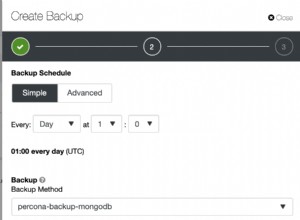Avvia redis-server e fornisci un argomento diverso per 'port' che può essere eseguito dalla riga di comando:
example@sqldat.com:~$ redis-server -h
Usage: ./redis-server [/path/to/redis.conf] [options]
./redis-server - (read config from stdin)
./redis-server -v or --version
./redis-server -h or --help
./redis-server --test-memory <megabytes>
Examples:
./redis-server (run the server with default conf)
./redis-server /etc/redis/6379.conf
./redis-server --port 7777
./redis-server --port 7777 --slaveof 127.0.0.1 8888
./redis-server /etc/myredis.conf --loglevel verbose
Sentinel mode:
./redis-server /etc/sentinel.conf --sentinel
example@sqldat.com:~$
Puoi farlo da, diciamo, /etc/rc.local anche in modo che ciò avvenga all'avvio.
Ma forse puoi anche ripensare il tuo approccio. Redis è così bravo a gestire le scritture che potresti cavartela semplicemente con un secondo database?




